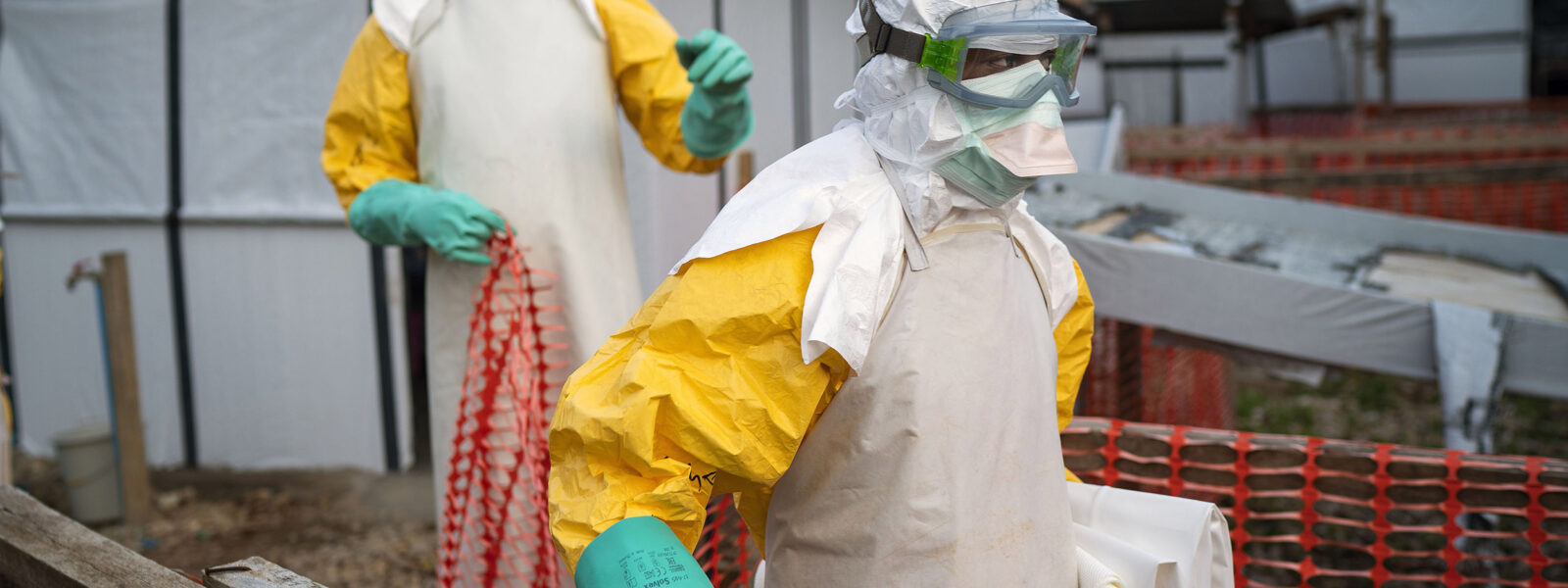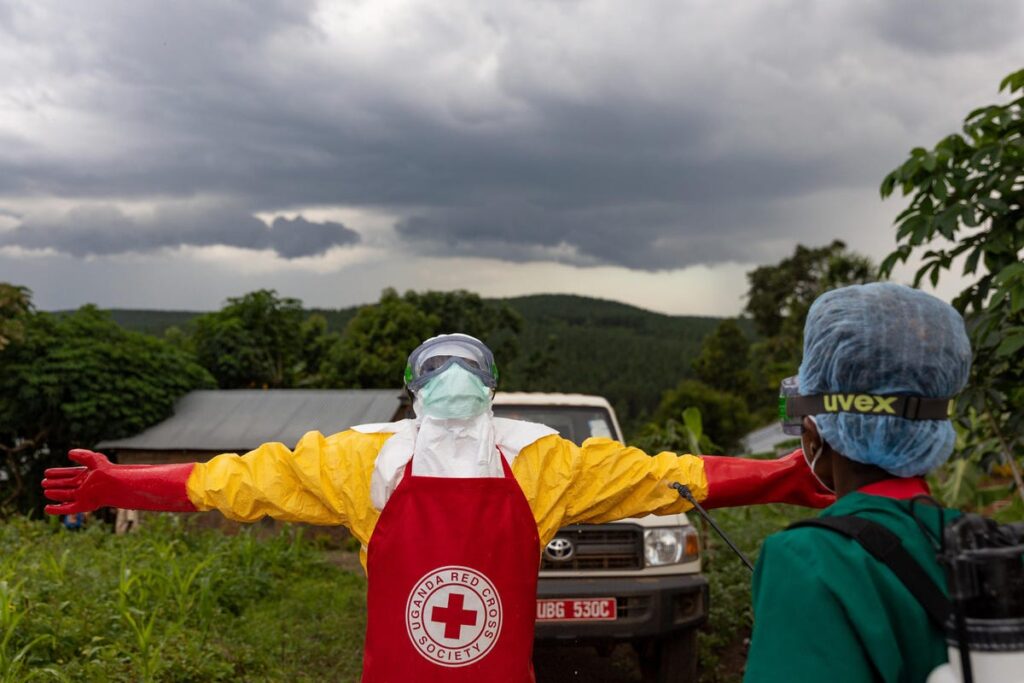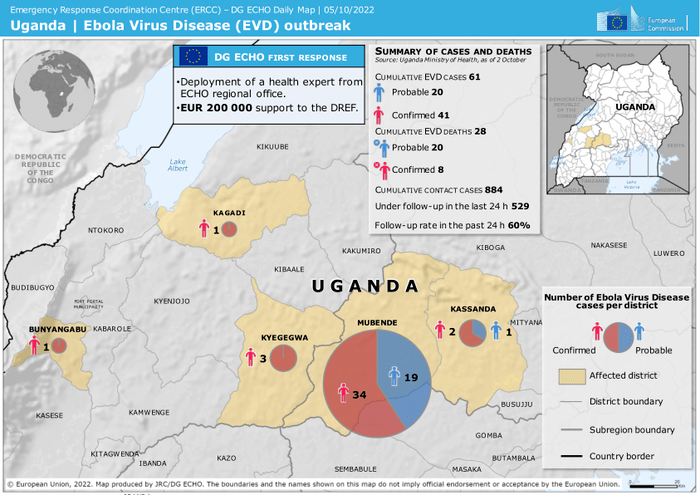The Ebola strain that recently hit Uganda is rumored to be of Sudan origin – with scanty information about the statistics, at least 64 people are reported as having contracted the deadly Sudan Ebola Virus Disease which currently has no Vaccine. However, the good news is that the disease is not as infectious as COVID-19 which literally spreads through the air. People like to easily contract the Ebola Virus Disease (EVD) are healthcare workers and family members caring for and directly in contact with the sick.
As of 19 September 2022, the Uganda Virus Research Institute (UVRI) released results of a confirmed Ebola Patient – a 24-year-old Male who is believed to have contracted the rare Sudan strain of Ebola – which has no known Vaccine. As we write out this article, there are about 64 people in Uganda suspected to be infected with a rare species of the Ebola virus (the Sudan Species). About 30 people have already died. Four of those deaths were health workers. Cases were first detected in the Mubende district among people living around a goldmine. Gold traders are highly mobile, particularly along the busy highway that runs between Kampala, a densely populated and globally connected capital of 1.68 million people, and the Democratic Republic of the Congo to the west. Countries have already started implementing surveillance measures; the United States has started redirecting travelers from Uganda to five US airports to screen them for the Ebola virus and is now monitoring them for 21 days to see whether symptoms develop. Neighboring countries like Kenya and Tanzania are on high alert.
Please note that the figures for Ebola cases and deaths in Uganda (herein mentioned) are a combination of probable and confirmed cases; not all have been confirmed by testing.
How is Uganda handling the recent Ebola Virus Disease outbreak?
In efforts to contain the Ebola virus in Uganda, several measures including the emphasis on locating persons who were near patients, particularly those who attended community funerals, have been put in place. Furthermore, at the epicenter of the outbreak, a 51-bed treatment facility is active in the Mubende region. President Museveni announced that two mobile laboratories will be delivered to Mubende, eliminating the need for people to go for tests and the risk of spreading the virus.
Medics have requested that the affected area be quarantined. President Museveni, on the other hand, has ruled out such limitations, stating that “Ebola is not disseminated like corona[virus]” because it is not an airborne disease. Markets, schools, and places of worship would stay open, he said, but he asked people to practice good hygiene and avoid close contact.
Still, in reaction to the outbreak, the country took quick national and sub-national actions to bolster all pillars of the response. To effectively coordinate the response, the country activated the incident management system and the National Multi-Stakeholder Task Force (NTF) chaired by the Ministry of Health and co-chaired by the WHO (World Health Organization).
Uganda has also activated District Task Forces (DTF’s) in ten high-risk districts, trained and deployed Rapid Response Teams (RRTs) and Village Health Teams (VHTs), and provided infection prevention and control equipment to the Mubende Regional Referral Hospital, including three Ebola kits capable of handling more than 300 Ebola patients.
Is it safe to Visit Uganda during this Ebola outbreak?
The Ebola virus has a much higher fatality rate than Covid 19 illness but thankfully it is not airborne like Covid19 so it is controlled easier. We just concluded the peak tourism season (June – September a time when many people visit Uganda on holiday and vacation. The most popular Uganda safaris include; gorilla trekking in Bwindi Impenetrable Forest National Park, wildlife safaris in Murchison Falls National Park, or Chimpanzee trekking in Kibale Forest National Park. Currently, many people planning visits to Uganda may be wondering if it is safe to visit Uganda now that an Ebola outbreak has been declared?
Yes, Uganda is certainly safe to visit and this is why. The hotspots for the virus have been identified and a national health response put in place to control the further spread of the various. These areas are also outside of the Uganda safari destinations that you will be visiting.
Because of the high death rate due to Ebola, the mention of it causes terror to many but thankfully it is not easily transmitted from person to person because it is through contact. When on your safari tour, you do not have close contact with people so there will not be any transmission. Besides, people without symptoms cannot transmit it. And you cannot be in touch with someone with symptoms because, by the time they exhibit the symptoms, they are transferred to the health center. Maintaining social distancing and washing hands with soap and water will control the spread.
So, unless the situation turns into a fully-out-blown Ebola pandemic across the entire country, which is unlikely because of the measures put in place, Uganda is safe to visit in the meantime.
Our advice about Travelling during the Ebola era in Uganda
The risk/chance of contracting the virus from the Districts reported having Ebola is very low (though not impossible). For this reason, we have come up with a list of precautionary measures that we recommend you adhere to during your travel across Uganda, and any other Ebola-infested areas.
- Avoid any kind of contact with sick patients/their body fluids, corpses, and/or bodily fluids from deceased patients, and all wild animals, both alive and dead.
- Avoid handling or eating bush meat (the meat of wild or feral mammals killed for food).
- Wash and peel all fruits and vegetables before eating them during your safari in Uganda.
- Regularly wash your hands with soap and water (or sanitize with alcohol gel when soap is unavailable).
- If you really must indulge in sex, please ensure to have safer sex using contraception.
You might also like this:





